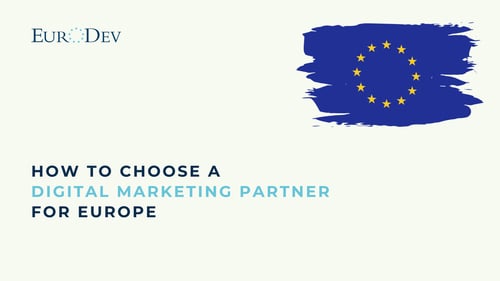E-Commerce Finds Success in Europe with Advanced Marketing
Online shopping has been the saviour of many retailers during and following the COVID-19 pandemic, both in the US and in Europe. However, these two markets have very different approaches when it comes to marketing their online sales channels. In Europe, a staggering 74 % of internet users shopped online in 2021, accelerating the sector’s growth and creating challenges for traditional retailers, many of whom made significant investments to compete with pure-play online sellers. If you are a US retailer that has expanded to Europe, how can you profit from the current situation and market yourself for the future?
The rise of retail media networks in Europe
One of the first steps that most retailers take when going online and creating a marketing strategy in Europe is incorporating retail media networks (RMNs) that provide a potential opportunity for them to drive profitable growth by scaling their e-commerce operations. RMNs leverage retailers’ knowledge of consumer buying behaviour to offer advertising opportunities for brands to target relevant consumers through a retailer’s digital channels, and physical store locations, and offer an opportunity to provide brands with direct access to customers. Research shows that 91 per cent of customers are more likely to spend on brands that provide relevant offers and recommendations, yet brands have traditionally had limited access to first-party customer data, limiting their ability to target audience segments.
Retail media opportunities and challenges in Europe
RMNs were established in the United States before COVID-19, which means that marketing and sales strategies tend to be more applicable to the US market and less flexible to incorporate the varieties that exist in the European markets such as multi-lingual audiences, cultural differences, and socio-economic diversity. In EMEA, the consumer shift to e-commerce during the pandemic encouraged retailers to re-examine RMNs as a means to quickly invest in and scale online sales channels. There are also differences between European and US markets which present specific opportunities and challenges for e-commerce marketing in Europe.

Do RMNs fall under the GDPR in Europe?
General Data Protection Regulation (GDPR), requires informed consent from users before they can be included in digital marketing campaigns. This consequently reduces the opportunities to use third-party data for advertising (a challenge compounded by moves to tighten privacy protections by companies). However, Retail Media Networks are built on first-party data, notably through loyalty programs. That makes RMNs one of the few ecosystems where companies can access valuable audience data and gain end-to-end attribution, which is incredibly valuable.
Digital experience differences between the US and Europe
The European data-privacy laws have affected the ways that European retailers use RMNs since consumer data is no longer as available as before. This has made European marketers look for alternative options that can circumvent the data laws without losing information about consumer habits. Their answer is the in-store digital experience. Many EMEA retailers have been more aggressive in seeking to monetize the in-store opportunity in response to the strict DPAs that vary from country to country inside the EU. The in-store digital experience is more advanced in Western Europe and China than in the United States, with companies such as Amazon, Nike, Zara, and Burberry investing in technology that will bring more customers and data to their stores.

US Retailers in Europe - What to Expect?
Most retailers want to build a successful e-commerce sales channel, especially as consumer shopping behaviour continues to migrate online. That being said, investing in digital infrastructure is expensive, and the financial considerations are amplified when brick-and-mortar stores are struggling. This means that the current situation doesn't allow much room for misallocated budgets and organizational miscalculations.
Discuss your E-Commerce marketing strategy with a team of experts and have a strategy that fits your needs perfectly.
Sources: Mckinsey
Discover more about Digital Marketing services provided by EuroDev.
Category
Related articles
-

5 Top Digital Marketing Strategies For The Beauty Industry
23 February 2024Attract, engage, convert: Master the top 5 digital marketing strategies & trends to dominate the...
Read more -

Navigating the Voice Search Revolution with Multilingual SEO
17 January 2024Unlock the potential of the Voice Search with Multilingual SEO. Learn how to navigate voice...
Read more -

How to Choose the Right Digital Marketing Partner for Your Expansion to Europe
13 October 2023How to choose the right digital marketing partner for your european expansion
Read more

